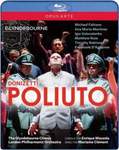|
Back
12/03/2016
Gaetano Donizetti: Poliuto
Michael Fabiano (Poliuto), Ana María Martínez (Paolina), Igor Golovatenko (Severo), Matthew Rose (Callistene), Timothy Robinson (Felice), Emanuele D’Aguanno (Nearco), Gyula Rab, Adam Marsden (Christians), The Glyndebourne Chorus, Jeremy Bines (chorus master), London Philharmonic Orchestra, Enrique Mazzola (conductor), Mariame Clément (director), Julia Hansen (designer), Bernd Purkrabek (lighting designer), François Roussillon (film director)
Live recording: Glyndebourne Festival, England (2015) – 132’ (including bonus)
Opus Arte OA1211D (or Blu-ray OABD7201D) – LPCM & DTS 5:1 – Color, 16:9 Anamorphic – Subtitles in English, French, German, Japanese, and Korean – Booklet in English, French and German (Distributed by Naxos of America)

   
This opera has a tangled history. Donizetti composed it in 1838 for (and with the participation of) the star tenor Adolphe Nourrit for the Teatro San Carlo in Naples. The librettist was Salvadore Cammarano who had also written the libretti for Lucia di Lammermoor and Roberto Devereux. However, the king intervened and banned it due to its religious content. Donizetti soon relocated to Paris, where it was re-worked, with the help of Eugène Scribe, into Les Martyrs, where it received mixed reviews (one negative was Berlioz who described it as a credo in three acts.) Still, it continued to be performed and was (re)translated into Italian as I martiri. The original was eventually produced in Naples in 1848 after Donizetti’s death (and a loosening of censorship). Both operas were quite widely performed and, just to confuse matters further, various hybrid versions popped up. They all faded from the repertory in the early years of the 20th century. It was given a revival at La Scala in 1960, with Maria Callas, Franco Corelli, and Ettore Bastianini. Despite the bel canto revival of the following decades, it has but a tenuous place in the repertory.
Hector Berlioz’s acidulous remark is not unwarranted. The work is exceedingly pious and deserves a production that gives it a degree of charisma. Mariame Clément’s modernish locale (Mussolini era perhaps?) and Julia Hansen’s drab designs do the opposite. The story tells of a Christian martyr, Saint Polyeucte, in third century Armenia under Roman rule. He refuses to renounce his religion and this inspires his wife, Paolina, to join him in his martyrdom. The libretto manages to work in a love triangle: wouldn’t you know it but the chief oppressor, Severo, is Paolina’s old flame. Director Clément, however, has decided to stage it as Christians doing the prosecuting (Poliuto at one point wears a fez-like hat), but this makes no sense at all.
Since we tend to hear what we see, the dreary visuals of this production tend to mute one’s response to the musical aspects, which are actually fine. Conductor Enrique Mazzola and a starry cast have fine-tuned Donizetti’s emotive bel canto style. Michael Fabiano brings his vocal electricity to the title role, while Ana María Martínez brings a soulful expressiveness to the role of the torn Paolina. Lower voices are also strong, with baritone Igor Golovatenko as Severo and bass Matthew Rose as Callistene, High Priest of Jupiter. The musical highlight is the concluding ensemble which features a bouncing rhythm similar to that used by Verdi in the Riccardo/Amelia duet in Act II of Un ballo in maschera.
This is a better recording to simply listen to than to watch. There is still the exciting recording from La Scala with Callas et al. There is another good one from 1986 with José Carrerras and Katia Ricciarelli in their dazzling heyday. There is also a well-received recording of Les Martyrs from a concert performance in 2014.
Michael Johnson
|